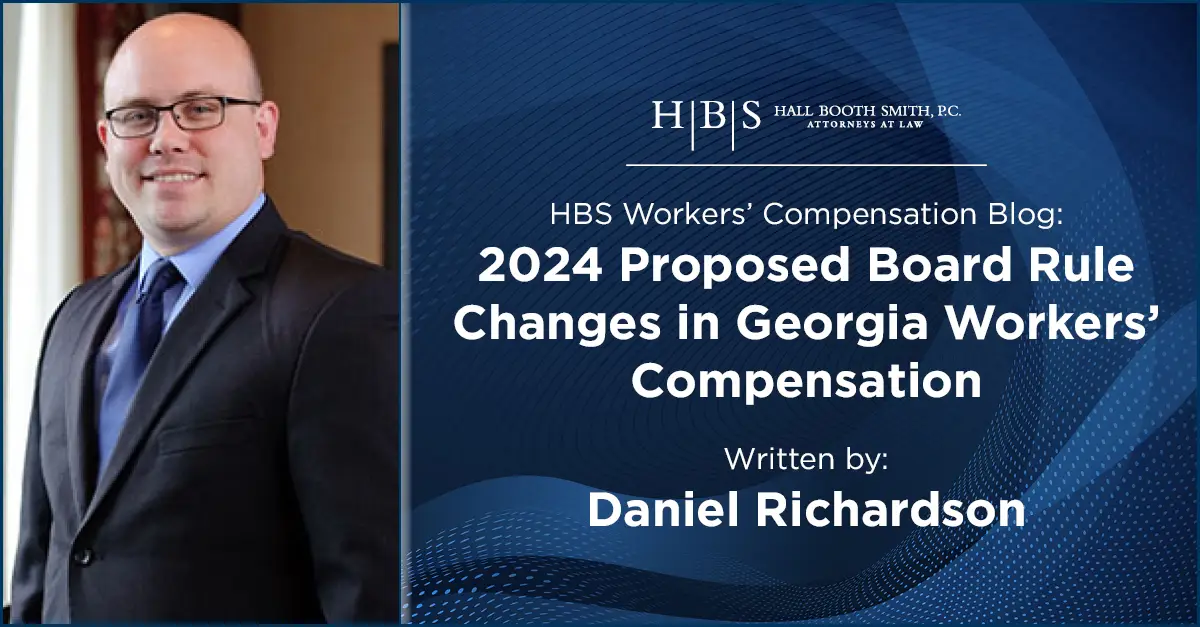
2024 Proposed Board Rule Changes in Georgia Workers’ Compensation
Introduction
The State Board of Workers’ Compensation in Georgia has recently posted several proposed rule changes, which it expects to take effect starting July 1, 2024. The proposed rule changes have been recommended by consensus of the Rules Committee of the Board’s Advisory Council. Employers, Insurers, and TPAs should take note.
Proposed Changes
Rule 61(b)
This rule is being amended to say that “Anyone filing a form with the Board must use the most currently revised version of the form.” Previously it said, “Anyone using a form…”
Rule 105
This rule addresses filing a petition for review with the Superior Court and with ICMS. This rule has previously been inconsistent with OCGA 5-3-7(h) regarding when a filing should be made with ICMS. To address the inconsistency, the amended rule will now read: “A copy of the petition for review should simultaneously be filed electronically through ICMS, but in no event later than 5 days after the petition for review is filed with the Superior Court in accordance with OCGA 5-3-7(j), which satisfies the requirement that a copy of the petition be served on the clerk of the Board.”
Rule 203(e)
This rule addresses travel expenses. With the proposed rule change, it will now say: “Where overnight travel is reasonably necessary, travel expenses shall include the actual reasonable cost of meals and lodging. Cost of meals shall not exceed $45 per day.” Previously, the cost of meals was limited to $30 per day.
Rule 221
This rule addresses electronic payments. A proposed rule to be added at the end of Rule 221(a) is as follows: “Payments by electronic funds transfer shall be considered to be made at the time the payer initiates an Automated Clearing House (ACH) electronic funds transfer with its financial institution.”
Rule 226
This rule is being amended to require attachment of supplemental documentation. As revised, Board Rule 226(b) will read: “Any applicant for conservatorship shall consent to a criminal history record check via a Form WC-226(a) or Form WC-226(b) at the time the petition for conservatorship is submitted to the Board.
In addition, the applicant shall attach supporting documentation necessary to process the request, including, but not limited to, marriage certificate, birth certificates, death certificate, custody orders, child support orders, and any other documentation requested by the Board. When a petition for appointment of temporary conservator for a legally incapacitated adult is submitted, an affidavit by a qualified physician who has recently examined the alleged legally incapacitated adult shall also be required in addition to the documentation listed above.”
Closing
As a general reminder of how things changed last year regarding indemnity, as of July 1, 2023, max TTD benefits in Georgia increased to $800.00 weekly, max TPD changed to $533.00, and the max benefit payable to a surviving spouse with no other dependents increased to $320,000.00.
If you have any questions about any of these changes, and how they may affect you, please feel free to reach out to our Workers’ Compensation team.
Disclaimer
This material is provided for informational purposes only. It is not intended to constitute legal advice nor does it create a client-lawyer relationship between Hall Booth Smith, P.C. and any recipient. Recipients should consult with counsel before taking any actions based on the information contained within this material. This material may be considered attorney advertising in some jurisdictions. Prior results do not guarantee a similar outcome.
Blog Overview
About the Author
Daniel Richardson
Attorney at Law | Atlanta Office
T: 404.954.6954
E: drichardson@hallboothsmith.com
Daniel Richardson practices in a variety of workers’ compensation matters. He has extensive experience evaluating and negotiating complex cases through to resolution and has taken cases to the Supreme Court of Georgia and the Georgia Court of Appeals.




Leave a comment
You must be logged in to post a comment.